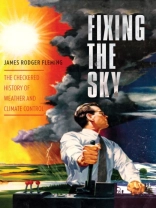As alarm over global warming spreads, a radical idea is gaining momentum. Forget cuts in greenhouse gas emissions, some scientists argue. Instead, bounce sunlight back into space by pumping reflective nanoparticles into the atmosphere. Launch mirrors into orbit around the Earth. Make clouds thicker and brighter to create a 'planetary thermostat.’
These ideas might sound like science fiction, but in fact they are part of a very old story. For more than a century, scientists, soldiers, and charlatans have tried to manipulate weather and climate, and like them, today’s climate engineers wildly exaggerate what is possible. Scarcely considering the political, military, and ethical implications of managing the world’s climate, these individuals hatch schemes with potential consequences that far outweigh anything their predecessors might have faced.
Showing what can happen when fixing the sky becomes a dangerous experiment in pseudoscience, James Rodger Fleming traces the tragicomic history of the rainmakers, rain fakers, weather warriors, and climate engineers who have been both full of ideas and full of themselves. Weaving together stories from elite science, cutting-edge technology, and popular culture, Fleming examines issues of health and navigation in the 1830s, drought in the 1890s, aircraft safety in the 1930s, and world conflict since the 1940s. Killer hurricanes, ozone depletion, and global warming fuel the fantasies of today. Based on archival and primary research, Fleming’s original story speaks to anyone who has a stake in sustaining the planet.
Spis treści
Preface
Acknowledgments
Introduction
1. Stories of Control
2. Rain Makers
3. Rain Fakers
4. Foggy Thinking
5. Pathological Science
6. Weather Warriors
7. Fears, Fantasies, and Possibilities of Control
8. The Climate Engineers
Notes
Bibliography
Index
O autorze
James Rodger Fleming is a historian of science and technology and professor of science, technology, and society at Colby College. He is a fellow of the American Association for the Advancement of Science (AAAS), elected 'for pioneering studies on the history of meteorology and climate change and for the advancement of historical work within meteorological societies, ’ and a fellow at the American Meteorological Society. He recently held the Charles A. Lindbergh Chair in Aerospace History at the Smithsonian Institution and the AAAS Roger Revelle Fellowship in Global Stewardship while a public policy scholar at the Woodrow Wilson International Center for Scholars. He enjoys fishing, good jazz, good barbecue, seeing students flourish, building a community of historians of the geosciences, and connecting the history of science and technology with public policy.












